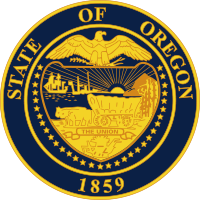Oregon Bottle Bill
The Oregon Bottle Bill is a container-deposit legislation enacted in the U.S. state of Oregon in 1971 and went into effect in October 1972 and it was the first such legislation in the United States. It has been amended in 2007 and 2011. It requires applicable beverages in applicable sizes in glass, plastic or metal cans or bottles sold in Oregon to be returnable with a minimum refund value. The refund value was initially 5 cents until April 1, 2017 when it increased to 10 cents. The Oregon legislature has given the Oregon Liquor Control Commission the authority to administer and enforce the Bottle Bill. A private cooperative Oregon Beverage Recycling Cooperative (OBRC) consisting of deposit initiating distributors administers the collection and transportation of used containers.
| Oregon Bottle Bill | |
|---|---|
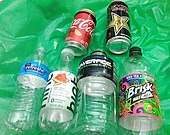 Examples of containers subject to refund value | |
| Oregon | |
Long title
| |
| Enacted by | 56th Oregon Legislative Assembly |
| Enacted | 1971 |
| Commenced | 1 October 1972 |
| Legislative history | |
| Bill | House Bill 1036 |
| Amended by | |
| 2007 and 2011 | |
| Summary | |
| Required refund value on beverage containers | |
| Status: In force | |
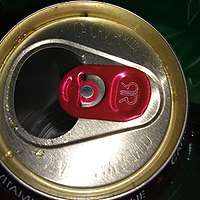

When passed in 1971, the bottle bill was viewed primarily as a litter control measure. In 1971 bottles made up about 40% of litter, 10.8% in 1973 and 6% in 1979. Oregon DEQ reports that the reduction is "as a result of the law" referring to the Bottle Bill.[1] In a 2006 publication it was reported that states without similar bills recycle on average 33% of their containers.[2] A 2016 study by Campbell, Benjamin, et al. found bottle deposit law only had a small impact of about 3% for clear glass and aluminum recycling rate when bottle deposit law coexists with municipal recycling program.[3] In 2015, more than 80% of Oregonians lived where curbside recycling is provided.[4] In the same year, the Oregonian's editorial board posited that the bottle deposit has become more redundant as curbside recycling became more common.[5] State law requires retailers and redemption centers to pay the refund value to consumers presenting containers covered under the bottle bill. Beverage distributors charge the initial deposit on shipments of beverages to retailers, who in turn pass it onto customers, however, charging deposit to consumers is not required by state law.[6] Beverage distributors retain all deposits not reclaimed by consumers. OBRC, the sole designated contractor for the State of Oregon has self-reported an estimate annual average of 85% in its 2018 annual report.[7]
Starting in early 2010s, OLCC approved redemption centers ran by distributors and there were 16 of them by April 2017. Several redemption centers have been plagued with issues revolving around transients, crime and drug activities and community objections to redemption center proposals have revolved around these issues.
Covered beverages (current as of February 2020)
The refund value has been 10 cents since April 1, 2017 and it applies to covered beverages in cans or bottles made from metal, glass or plastic.
3 liters or less[8]
- Water and flavored water
- Beer or other malt beverages
- carbonated soft drinks.
- kombucha
- hard seltzer
4 oz to 1.5 liters
Any beverages other than the above in sizes 4 oz to 1.5 liters in metal, glass or plastic containers are subject to a 10 cent refund value. The OLCC announced in December 2019 that milk based products such as klefir, drinkable yogurt, milk-based smoothies and milk or plant-based milk with other ingredients that have been previously excluded will be included,[9] however, on February 9, 2020, Willamette Week reported OLCC announced on February 5, 2020 that it was reversing this decision.[10]
exclusions to the refund value requirements[8][11]
- distilled liquor, and any beverages containing distilled spirits in any amount.
- wine, including mead and hard cider over 8.5% ABV
- milk and plant based milk
- infant formula
- vinegar (except drinking vinegar)
- flavoring and condiments, including juices not normally drunk without mixing, like lemon and lime juice
- concentrates and syrup[12]
- meal replacements
Deposit redemption
On March 15, 2020, OLCC allowed grocery stores to stop accepting bottle returns during the COVID-19 pandemic through at least the end of May, 2020;[13] however OBRC operated centers remain open and all bag drop off sites will remain open.[14] The Bottle Bill reprieve was amended on May 22, so that enforcement begins two weeks after the county in which the store is located in has entered phased 1 of reopening schedule.[15]
Bag drop off redemption
In this redemption method, consumers create an account and fill designated bags with empty containers and drop off the filled bags to a participating location. They're collected and taken to a processing center and refund value is credited to the consumer's account after they have been counted.[16] Drop locations are not staffed.[17] After the contents are counted, the spent green bags are sent to a landfill.[18]
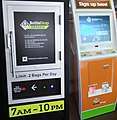 BottleDrop Express drop vault for depositing tagged green bags and a BottleDrop kiosk for account access and label printing.
BottleDrop Express drop vault for depositing tagged green bags and a BottleDrop kiosk for account access and label printing.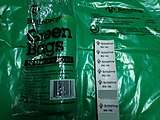 Green bag and bag tags printed from the kiosk for use with drop off service.
Green bag and bag tags printed from the kiosk for use with drop off service.
Concerns around fraudulent conduct
Theft from curbside bins and receptacles
It is unlawful under Oregon Revised Statutes 459A.080 to remove recyclable containers set aside for collection by a city or county collection service without the permission of the owner or generator of the contents, which includes going through curbside bins for containers with deposit value.[19] It is also unlawful to remove recyclable material from a container, box, vehicle, depot or other receptacle for the accumulation or storage of recyclable material without permission of the receptacle's owner.[20] Violation of ORS 459A.080 is a class A misdemeanor criminal offense per ORS 459.992(1)(d)[21] In the Oregon Supreme Court case State v. Waterhouse,defendant, a scrapper, was found guilty of intentionally appropriating scrap metal having some value to himself.[22]
Issues attributed to refundable container thefts
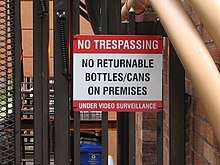
In December 2018, The Columbian reported neighbors in the Cascade Park neighborhood in Vancouver, Washington near the Oregon border have noticed thefts of cans and bottles as well as the curbside bins. A district manager for Waste Connections reported glass volume processed by its subsidiary Columbia Resource Company that handles Clark County, Washington saw a 9% reduction in glass bottles returned after the deposit increased from 5 cents to 10 cents in Oregon in 2017. He attributes the likely cause to theft. Removal of contents from recycling bins or nearby them without the consent of the generator or the hauler is prohibited in Clark County.[23] Waste Connections did not provide an exact number on thefts from recycling bins, but reported enough is removed and taken to Oregon to have a financial impact for Waste Connections which sells recyclable materials collected.[24] The Columbian reported in June 2019 that reports of scavengers rummaging through recycling bins have increased in the past year. The newspaper reports scavengers target cans and bottles that have value across the Columbia river which undercuts the hauler as well as generating complaints from the public. Marty Smith, writing for the Willamette Week reports that community members in Vancouver started complaining about theft of cans and bottles from their recycling bins. Smith remarked that such theft in Portland is "as shocking as tattoos on a barista".[25] To better track complaints related to recyclables scavenging, the Clark Regional Emergency Services Agency is looking into a way of tracking scavenging complaints.[24]
In September 2019, a waste hauler Recology for Ashland told the Ashland Tidings that in addition to theft, its drivers were experiencing harassment by emboldened recyclables thieves that they had to improvise plans to deal with theft and harassment of drivers by thieves.[26] Recology receives many calls from customers concerning people going through their bins. The company recommends people to not put out their redeemables, donating them to charities or redeeming them themselves to reduce this problem.[27]
Oregon DEQ survey reports over half of property managers interviewed identified the use of waste collection area by non-tenants, such as transients, a problem that cause issues such as contamination of recyclable materials.[28] Oregon DEQ opined retrieval of returnable containers as the motivation for transients and other non-tenants to access the collection areas.[28]
Redemption of previously redeemed containers
Jules Bailey, the chief stewardship officer for OBRC told Mail Tribune there have been instances of people attempting to redeem cans that have already been redeemed through a machine.[29] State of Oregon provides information for how to identify containers that have already been redeemed through a machine. "Cans that have been fed through a reverse vending machine will have small square indentations or perforations and will be fairly symmetrically crushed, and bottles will have a crushed neck."[30]
Fraudulent redemption of out-of-state containers
Redemption of out-of-state containers is considered a fraud and prohibited by the bottle bill. Retailers and redemption centers may refuse to accept containers when they reasonable grounds to believe they were purchased outside of Oregon. Staff at some locations near the state border request receipts proving they containers being redeemed were purchased in Oregon.[17][31] Fraudulent redemption has been a problem according to KATU news. As told to KATU reporter by a coop (OBRC) representative, the redemption center staff at Delta Park near the state boundary catches about 50 people a day from Washington.[32] C-TRAN which operates public transit service that traverses between Vancouver, Washington and Portland have banned the carrying of empty beverage containers on their service for safety and sanitation reasons; not because of transients who carry Washington cans across the state line to redeem them in Portland.[33] Jules Bailey speaking on behalf of the OBRC states he does not know the magnitude of the problem, but that it is mostly an issue with Washington containers around the Columbia corridor and minimal issues with California or Idaho.[34] Senate Bill 522 sponsored by Betty Johnson from Scappoose fines those who bring out-of-state containers. She told KGW "retail grocers in her district every day are overwhelmed with massive bottle returns from the Washington side of river, sometimes by the pickup load."[35] Within the public hearing referenced within the KGW article, the store director for Saint Helens, Safeway testified to the committee that he's seen a dramatic increase in Washington residents returning containers at his Safeway and described his account of people arriving in Washington plate vehicles with cases of bottled water and emptying them out on the parking lot to prepare the bottles to return into bottle machines.[36] Northwest Grocery Association's president Joe Gilliam reported redemption rates at redemption centers near the Oregon state border have seen a sharp rise, sometimes over 100% following the deposit value increase in Oregon.[23]
Bottle deposit motivated welfare fraud "water dumping"
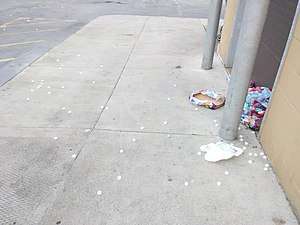
"Water dumping" is a term dubbed by the United States Department of Agriculture referring to a commonly perpetrated welfare fraud by cash seeking welfare recipients purchasing bottled water so they can empty them out and redeem containers for the redemption value in cash.[37] In September 2012, such scheme was not considered a fraud in Oregon.[38][39] In February 2013, USDA expanded the Supplemental Nutrition Assistance Program fraud definition to include water dumping.[40] The USDA intends to place repeat "water dumping" offenders on the nationwide lifetime SNAP ban list.[41] In August 2019, KTVZ shared a video recorded by a grocery store employee in La Pine of a man dumping contents of soda that had been purchased with Oregon Trail SNAP card. According to the statement provided to the reporter by the employee, it was a common occurrence. Oregon Department of Human Services told KTVZ that it is considered a fraud that may result in a termination of benefits and the state is cracking down on this fraud this year.[42] Springfield police observed a man and woman emptying bottles in September 2019. When contacted, the woman admitted to police they were emptying water they had purchased on SNAP to cash the containers so they can use the money to purchase fuel. The woman was arrested on outstanding warrants and the police reported the water dumping incident to the Oregon Department of Human Services.[43][44]
Community concerns regarding beverage container redemption centers (BCRC)
In order to open a redemption center, it must be approved by OLCC.[45] A site was proposed at southwest 17th Avenue and west Burnside Street in Portland in 2014. OLCC received about 200 comments, most of which were against the center. Stakeholders such as dozens of neighbors and businesses including Portland Timbers and Portland Thorns FC opposed the establishment of the beverage container redemption center. Many objections related to foresight of vagrants and crime related to transients with shopping carts with scavenged cans flocking to the new redemption center.[45]
Beaverton
A redemption center opened up in May, 2017 in Beaverton.[46] KATU's Andrew Reed reports neighbors report BottleDrop brought in people "who routinely act suspicious and are causing problems" in the neighborhood. A nearby veterinarian interviewed reports BottleDrop "brought a wave of problems to his property". He reports one of his business' security camera was ripped off and had someone break into his practice' bathroom to use drugs. In addition, he reports shopping carts getting left on his property almost daily as well as finding bottles of urine; offering a list of issues of security, noise, odor, traffic, littering, drug paraphernalia and transients. A resident behind the redemption center reported seeing public urination and became suspicious of people he believes to be acting suspiciously near his home.[47] The dean of students for Jesuit High School commented "Our school is less safe now" referring to the presence of OBRC's BottleDrop redemption center. Supporters of the center were the Oregon Food Bank which participates in its fundraising program and two science teachers from Meadow Park Middle School,[48] which is approximately four miles from the site.
Bend
In September 2017, KTVZ described that businesses near the Bend BottleDrop Center have "noticed a difference in the neighborhood ever since the Bottle Drop moved in". The news reporter described businesses have seen transient encampments nearby and felt the BottleDrop attracts transients.[49] In 2017, Bend police responded to 270 calls at the BottleDrop. In four months period leading up to when the story was written on July 16, 2018, two subjects were arrested for offensive littering and 11 were arrested for drug offenses at the BottleDrop property.[50] Bend Police arrested 24 people in 4-months period leading up to July 12, 2018 around the BottleDrop for matters such as drug possession, stealing shopping carts from retailers and offensive littering.[51]
Medford
In June 2018, Damian Mann of Mail Tribune reports nearby business owners say the OBRC's redemption center has been a " magnet for methamphetamine "tweakers" who cash in their bottles and head out to buy drugs and "unsavory behavior". These Medford businesses also said they began noticing vagrancy, theft and vandalism ever since BottleDrop redemption center opened. In 2018, the owner of Southern Oregon Crane in Medford testified to the city council "It’s like living right next to a crack house." in reference to the redemption center.[52] The redemption center has been in place since November 2014 in Medford.[53]
Portland Delta Park
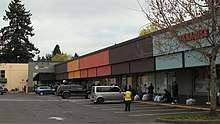
On March 27, 2020, Delta Park BottleDrop's landlord TMT Development issued a notice of default citing health and safety concerns. After a long line started to form outside the store, TMT states BottleDrop has not been managing social distancing requirements relating to COVID-19 pandemic. The notice directed them to comply with 6 ft social distancing rule or face eviction.[54][55] The same weekend, the police were called to the redemption center after a man made death threats.[56] TMT Development's CEO says nearby businesses have complained about BottleDrop's patrons blocking their doors, standing too close together as well as violence, according to The Oregonian.[57] In April, TMT development installed a fence around a grassy property after drug needles were found.[58] TMT has also deployed armed guards to prevent people from queuing up in the parking lot or in front of other businesses.[59] This area has been used by BottleDrop's customers, but it is not part of the formal lease agreement.[60] TMT's president cites they needed to step in to prevent fights and drug dealing.[61] The manager of a sporting goods store interviewed by Willamette Week said he's seen drug deals and fights in front of the OBRC's BottleDrop.[61]
Retailer requirements
Retailers are required to refund deposit to consumer when they present containers as set forth by the bottle bill. The requirements are dependent on whether the size of the store is greater than or equal to 5,000 square feet, distance from the redemption center, and the retailer's participation in the program. During the COVID-19 Pandemic, OLCC has relieved retailers of obligations to accept bottle returns until the county in which the retailer is located has entered the phase 1 reopening with enforcement beginning two weeks after the transition.[15]
Retailers' right to refuse bottle returns
Retailers and redemption centers are allowed to refuse containers contaminated with anything other than ordinary dust, the original contents or water. Additionally, when staff have reasonable grounds to suspect the containers were not purchased in Oregon. BottleDrop redemption centers use individuals arriving in a vehicle with Washington license plates as a reasonable ground to suspect they were purchased outside Oregon unless they can prove the beverages were purchased in Oregon.[23] If there are reasonable such grounds, retailers may request a receipt.[17] The OLCC says retailers should reject containers that appear to have been redeemed already. OLCC describes cans that have already been through the machine are characterized by "small square indentations or perforations and will be fairly symmetrically crushed" and plastic bottles will have a crushed neck.[17]
Over 5,000 square feet
Participating retailers over 5,000 square feet retailers within two miles (zone 1) from a redemption center are not required to accept any container. If in zone 2 (up to 3 1/2 miles from center), they are required to accept 24 per person, per day. Retailers outside of the zone are required to accept 144. Retailers within the zone that choose not to participate to redemption center program are required to accept 350 containers per person per day.[17]
Under 5,000 square feet
They're required to accept 24 containers per person per day if they're within either zone 1 or zone 2 of the redemption center.
Retailers under 5,000 square feet (small shop, convenience stores and like) outside the two zones are allowed to limit the quantity to 50 containers per person per day. They can also limit them to the brand and size they sell.[17]
Within these limitations, retailers are required to accept containers all hours they're open for business and it is unlawful for retailers to refuse containers unless:
- Containers are damaged to the extent that the brand cannot be read
- Contaminated with anything other than ordinary dust, water or contents.
Bottle return machines are provided for retailers' convenience. Even when machines are broken, retailers continue to have legal obligations to accept containers even if they have to hand count them.
Redemption value flow
State law mandates a payment of redemption value upon presentation of container. Deposit initiator is not required and charging deposit to consumers is voluntary.[6] Bottle deposit is generally initiated by distributors and charged on each transaction.[17] Covered products sold within the State of Oregon must read "OR 10c" for compliance purposes. For redemption purposes, OBRC's BottleDrop service will redeem all covered containers regardless of marking.[62] Deposit that is not redeemed is kept by distributors such as Columbia Distributing and Maletis Beverages. Willamette Week's Nigel Jaquiss was uncertain about the environmental benefits but opined "the increase will create a big payday for the companies that distribute beer and soda."[63] The Oregon legislature has given the OLCC the authority to enforce and administer the Bottle Bill.[64] OBRC, a group of deposit initiating distributors administers the collection and transportation of deposit bearing containers.[65] Containers that are recycled through curbside recycling are not counted towards redemption rate statistics and waste haulers do not receive the redemption value.[66] The value of scrap materials sold is not included in the OBRC's operating budget.[7] OBRC distributes the revenue from selling recyclable materials to distributors that form the cooperative membership.[66] The disbursement amount to individual cooperative member is determined based on proportion of containers and materials returned that are attributed to each member.[67]
In 2016, OLCC refused to release the monetary value of the deposit kept by distributors when Willamette Week asked for it. OLCC responded "we are forbidden from releasing any numbers other than a percentage". The newspaper appealed to the Oregon Department of Justice which ordered the numbers be released as a matter of public record in September 2016. The newspaper said that the beverage industry lobbyist Paul Romain said the distributor wanted the individual companies numbers private. The data showed that distributors were keeping about $30 million annually.[63] The OBRC reports an annual volume of: 21.3 million pounds (10,600 short tons) of aluminum, 13.4 million pounds (6,700 short tons) of PET, and 104 million pounds (52,000 short tons) of glass.[68] In August 2019; State of California listed scrap values at $1064.19/ton for aluminum, $10.33/ton for PET, and -$1.93 for glass[69] In 2017, OBRC's expenses were $34 million. $9 million of which was paid by distributors and $25 million was paid by the unredeemed deposit.[66] OBRC had 500 employees and a budget of $43 million for 2018.[70] During the same year, $29 million of the budget was paid for with unredeemed bottles. Remaining were paid by cash contributions from grocers and distributors.[71]
History
Oregon's 1971 Beverage Container Act (ORS 459A.700 to 459A.740)[72] was the first such legislation passed in the United States.[73][74] It went into effect on October 1, 1972.[75]
1970s
Before the formal 1971 Oregon Bottle Bill, Oregon had already set up a less formal bottle return system that most stores and some of the public cooperated with. Inspired by the early Vermont bottle return system before it was repealed, Oregon's limited system paid 1 cent for beer bottles and cans and 3 cents for soda bottles and cans, and was started in the mid-1950s, and lasted through the rest of the 50s, throughout the 1960s and into the early 70s until the more formal and expanded Bottle Bill was enacted. The emphasis was on bottles, as bottlers were washed and re-used for fresh product sold to the public before health laws were enacted that stopped the re-wash system. And because of the low payout for the return of bottles and cans, and in spite of various anti-litter PSA advertising campaigns on Oregon television, only a relatively small percentage of Oregonians participated in the return of bottles and cans, and thus many bottles and cans still littered Oregon's highways and scenic areas throughout this entire early bottle-can recycling period.
Richard Chambers, a logging equipment salesman,[76] collected litter during his hiking, climbing, and kayaking throughout the state. In 1968, he called Oregon State Representative Paul Hanneman, whom Chambers knew well, after he was inspired by a small newspaper article about British Columbia wanting to ban non-refundable bottles and cans. Chambers wanted a deposit on bottles and cans to encourage people to return them to the store.[77]
Chambers began a letter-writing campaign, using non-ordinary stationery and stamps to draw the attention of his intended audience. Oregon House Bill 1157 was introduced and assigned to the House State and Federal Affairs Committee. Chambers brought in people to testify for the bill, including a river guide to testify about the amount of beverage package litter in the water, and a farmer who lost four cows because of ingestion of glass and metal shards from beverage containers. Beverage container materials companies and bottling companies fought the bill. Hanneman offered the compromise of not banning non-returnables but instead requiring a five-cent deposit as an incentive for return. By a 5 to 4 vote, the bill was sent to the House floor, where it fell 3 votes short of passage, with 27 of 60 members voting for it. Governor Tom McCall had already offered his support for the bill, so Hanneman asked McCall to help sway the House's vote in favor of passage. McCall refused, advising that he did not want a Bottle Bill in that legislative session. McCall planned to endorse the anti-littering campaign espoused by the Keep America Beautiful non-profit in 1970 and wait until 1971 to support the Bottle Bill. It has been written that this delay was intentional on McCall's part to make the bill his. After its defeat, Chambers continued his letter writing campaign.[77]
After McCall refused to back the Bottle Bill in 1969, he sponsored the formation of non-profit SOLV—Stop Oregon Litter and Vandalism. In 1971, it was reported that 75% of SOLV's budget was derived from organizations opposing the bottle bill. SOLV also received state funds.
In 1970, McCall initiated his own campaign for the Bottle Bill. Bill Chambers and Don Waggoner (1935–2016)[78] worked to get the bill approved.[79] Among opponents of the bill were grocery stores who feared financial strains with the processing of returns. John Piacentini, the owner of Plaid Pantry convenience stores, challenged people to return soda and beer bottles to his stores for a half cent. Piacentini said he hoped to be buried in litter; within two weeks, 150,000 cans were returned and McCall ordered National Guard troops to take the bottles and cans away. This helped allay grocery stores' fears.
The new bill, House Bill 1036, banned non-returnables and placed a five-cent[80] deposit on bottles and cans containing beer, malt beverage, mineral and soda waters and carbonated soft drinks. The law went into effect on October 1, 1972.[75] The law mandated beer, malt liquor and carbonated soft drinks in refillable containers that were certified for use by multiple manufacturers to have a minimum of 2 cent per container deposit. Those beverages in other types of containers were required to have a 5 cent refund value.[81]
The first 6 months into the bottle bill
Prior to the Bottle Bill becoming enacted, about 51% of soft drinks were sold in refillable glass bottles, 41% in cans and 8% in non-refillable glass bottles. In December 1971, the OLCC estimated about 35% of beer sold in Oregon were sold in cans. In December 1972, 99.5% of beer was sold in bottles with the remainder being sold in cans.
In March 1973, all soft drinks sold in Oregon were in refillable bottles, except for less than 1% that were sold in cans.
In March 1973 prices, beer cited as an example cost $1.58 for a six pack including 30 cent deposit in non-refillable containers and $1.17 for 6 in refillable bottles which included a 12 cent deposit.[81]
In 1974, the state reported that litter of beverage containers had been by reduced by 83 percent.[82]
1990s to present
In 1996, voters rejected a ballot measure that would have extended the bottle bill. In 2005, Republican Party Representative Vicki Berger (daughter of Chambers) introduced another bill to extend the bottle bill, but it was defeated in the Senate.
On June 7, 2007, Governor Ted Kulongoski signed Senate Bill 707 into law, which added water bottles to the refund law. The law went into effect January 1, 2009.[83][84] Of the nine states that had bottle bill laws at that time, only Maine, California, and Hawaii included water bottles.[85]
The 2007 legislature also created a task force, charged with making recommendations for further updating of the Bottle Bill to the 2009 legislature. Updates under consideration in the late 2000s included adding products like wine and juice bottles, and increasing the refund amount from 5 cents.[86]
The Container Recycling Institute estimates that 125 million disposable water bottles were sold in Oregon in 2005, more than the number of soft drink bottles, and the recycling rate for water bottles was 32 percent, compared with 82 percent for beer and soft drink bottles.[87] Container Recycling Institute is a research and advocacy group in support of the bottle bill.[88][89]
OLCC approved redemption center ran by distributors on an experimental basis in early 2010 where two locations were opened. One in Wood Village and another in Oregon City. By April 2017, there were 16 redemption stations.[90] The first redemption center intended to migrate redemption activity away from retail stores opened in Wood Village in September 2010 and it included bag drop off service as well.[91]
In 2016, the OLCC announced that the redemption value would be increased to 10 cents from 5 cents in April 2017,[92] the first-ever increase.[93] The refund value has been 10 cents per container since April 1, 2007.[94] The change was triggered by a provision of state law enacted by the legislature in 2011,[95] which says that the redemption value must be increased to 10 cents if the return rate for containers falls below 80 percent for two consecutive years.[93] The return rate was 64.5% in 2015 and 68.3% in 2014.[92] The return rate is not an indication of recycling rate. Containers recycled through curbside recycling is not accounted in the return rate.[4]
The next change came into effect in January 2018, when additional categories of beverages were required to have a deposit.[12]
September 2019: Modification to include all kombucha and hard seltzer 3 liters and under into covered beverages. (SB 247).[96]
January 2020: The OLCC announced the addition of 4oz to 1.5 liter sized Kefir, drinkable yogurt, milk-based smoothies and other beverages which are mostly milk or milk substitute with additions of other ingredients. Milk and plant-based milk substitutes are not covered,[9][97] however, the same agency announced it was withdrawing the decision[98] on February 5, 2020 due to the concerns caused by spilt milk in the OBRC's back-end.[10] In the 2018 expansion, Kefir was exempt from having a refund value.[12]
The OLCC removed the obligations of grocery stores to accept bottle returns during the COVID-19 pandemic. The Bottle BIll is not subject to enforcement at least through the end of May 2020. The commission is scheduled to convene a meeting to discuss this matter in May 2020.[99]
Context
| States first enacting a Bottle Bill[100][101] | ||||||||||||||||||||||
|---|---|---|---|---|---|---|---|---|---|---|---|---|---|---|---|---|---|---|---|---|---|---|
|
Deposits on refillable glass bottles were the norm well before the 1930s, at which time the disposable steel beverage can began to slowly displace glass. By 1960, almost half of U.S. beer was in cans, while only five percent of soft drinks were not in bottles.[102]
Vermont passed the first "bottle bill" in 1953, but it only banned non-refillable bottles and did not introduce a deposit system. It expired in 1957 after beer industry lobbying.[102]
British Columbia enacted North America's oldest beverage deposit system in 1970.[103]
Beverage containers constituted 58% of litter in Kentucky in 1999.[104] States which have adopted bottle deposits have reduced litter as much as 64%.[105] The container deposit system cost averages 1.53 cents per container (versus 1.25 cents for other collection systems) and are more than two and a half times more effective at recycling containers.[106]
In 1991, Germany enacted an entirely different method which taxes manufacturers on the basis of the amount of packaging.[107] Many German packagers now participate in the Green Dot program as a result of this.
By 1968, beer and soda companies were responsible for 173 million bottles and 263 million cans each year in Oregon.[108]
References
- Department of Environmental Quality (2007). "Fact Sheet: The Expanded Bottle Bill" (PDF). Oregon Department of Environmental Quality. Archived from the original (PDF) on 2008-09-10. Retrieved 2011-04-20. Cite journal requires
|journal=(help) - Gitlitz, Jenny & Franklin, Pat. (2006) Container Recycling Institute. The 10 Cent Incentive to Recycle"
- Campbell, Benjamin; Khachatryan, Hayk; Behe, Bridget; Hall, Charles; Dennis, Jennifer (January 2016). "Crunch the can or throw the bottle? Effect of "bottle deposit laws" and municipal recycling programs". Resources, Conservation and Recycling. 106: 98–109. doi:10.1016/j.resconrec.2015.11.006.
- The Oregonian Editorial Board (2015-08-04). "Bottle bill may have outlived its usefulness: Editorial". oregonlive.com. Retrieved 2019-06-29.
- The Oregonian Editorial Board (2015-01-14). "The bite of Oregon's bottle bill: Editorial". oregonlive.com. Retrieved 2019-06-29.
- Bottle Bill 101 information session at House Committee On Energy and Environment May 2, 2019 1:00 PM - Jules Bailey, Chief Stewardship Officer, Oregon Beverage Recycling Cooperative. 1 hrs 7 min at:http://oregon.granicus.com/MediaPlayer.php?clip_id=26771&meta_id=1356197
- "Oregon Beverage Recycling Cooperative 2018 Annual Report" (PDF).
- "OLCC letter" (PDF). Oregon Liquor Control Commission. November 4, 2019. Archived (PDF) from the original on February 3, 2020. Retrieved February 3, 2020.
- "Oregon Bottle Bill Changes, Additions Coming in 2020" (PDF). OLCC. December 20, 2019. Archived (PDF) from the original on February 3, 2020. Retrieved February 3, 2020.
- Jaquiss, Nigel (February 9, 2020). "Spilt Milk: The Oregon Liquor Control Commission Reverses Course on Dairy Containers". Willamette Week. Retrieved 2020-02-10.
- "ORS 459A". State of Oregon. Retrieved 20 April 2013.
- "2018 Expansion FAQs" (PDF). Oregon Liquor Control Commission. Retrieved 3 January 2018.
- "Most Portland stores stop accepting bottle returns; TriMet creates free shuttle to bottle drop". KGW. Retrieved 2020-04-30.
in video
- "Most Portland stores stop accepting bottle returns; TriMet creates free shuttle to bottle drop". KGW. Retrieved 2020-04-30.
- Staff, KATU (2020-05-22). "OLCC modifies bottle return guidelines". KATU. Retrieved 2020-06-01.
- Falkers, Brittany (April 22, 2019). "'Redemption rates have skyrocketed': Oregon BottleDrop program seeing more participation". KGW. Retrieved 2020-04-30.
- "Bottle Bill FAQ" (PDF). OLCC Bottle Bill FAQ.
- http://oregon.granicus.com/MediaPlayer.php?clip_id=26771 House Committee On Energy and Environment 2019-05-02 1PM, 54:00, Jules Bailey(OBRC)
- Stafki, Brian (January 2018). "Oregon Multi-Tenant Statutes,Rules and Guiding Documents" (PDF). Oregon Department of Environmental Quality. Archived from the original (PDF) on May 18, 2019. Retrieved May 18, 2019.
No person may remove source-separated recycling set out for collection — such as someone scavenging deposit containers
- "ORS 459A".
- "ORS 459".
- "Willamette Law Online - Oregon Supreme Court Updates - State v. Waterhouse | Willamette University College of Law". willamette.edu. Retrieved 2019-05-09.
- Thomas, Jake (2018-12-04). "Oregon senator to introduce bill to thwart return of bottles, cans bought in Washington". The Columbian. Retrieved 2019-05-21.
- Thomas, Jake (June 3, 2019). "Washington, Oregon agencies tackle redeemable recyclables issue". The Columbian. Retrieved 2019-09-08.
- Smith, Marty (August 14, 2019). "Do Stores Get Compensation For Handling Bottle Redemption? Some Employees Seem to Spend Their Whole Shift on It". Willamette Week. Retrieved 2019-09-08.
- Tidings, By Nina Egert for the (2019-09-23). "Glass thieves lead to discovery". Ashland Tidings. Retrieved 2020-04-01.
- Currier, Carsyn (2019-10-04). "Recycling company speaks out on controversial problem". KTVL. Retrieved 2020-04-11.
- Stafki, Brian R (April 18, 2018). "The State of Multi-Tenant Recycling in Oregon" (PDF). Oregon DEQ. Archived from the original (PDF) on May 26, 2019. Retrieved May 26, 2019.
3.4.12 Non-tenant use
- Group, Sinclair Broadcast (2017-04-24). "BottleDrop center accepts crushed cans on case by case basis". Mail Tribune. Retrieved 2019-05-04.
- "Oregon's Evolving Bottle Bill. Does a retailer have to accept crushed containers?". www.oregon.gov. Retrieved 2019-05-04.
- "BottleDrop Oregon Redemption Centers FAQ". Retrieved May 2, 2019.
No, bringing any amount of out of state purchased cans and bottles in to Oregon for a refund is fraudulent per the Oregon Bottle Bill. A person does not have to be an Oregon resident to redeem containers in Oregon, but only beverage containers that were purchased in Oregon may legally be redeemed in Oregon. If you live out of state and purchase deposit eligible containers in Oregon, we advise to keep those receipts to present to BottleDrop staff upon request.
- English, Joe (December 8, 2018). "Oregon recycling centers seeing more non-redeemable containers -- from Washington". KATU. Retrieved May 2, 2019.
- "C-Tran to ban empty bottles and cans". The Columbian. 2018-09-14. Retrieved 2019-05-02.
- http://oregon.granicus.com/MediaPlayer.php?clip_id=26771 House Committee On Energy and Environment 2019-05-02 1PM, Jules Bailey (OBRC) 23:20
- Rollins, Michael (March 13, 2019). "Bill fines people who redeem Washington bottles & cans in Oregon". KGW. Retrieved 2019-05-03.
- Knight, Doug (March 14, 2019). "To: Oregon Legislation SB 522 Committee RE: Washington beverage containers returned to Oregon".
- "Food stamp 'water dumping' scam continues". Bangor Daily News. Retrieved 2019-05-21.
- Steele, Ty (2012-09-13). "Oh SNAP! Water dumping as a food stamp scam". KVAL. Retrieved 2019-05-21.
- Ty Steele (2014-04-28), WATER DUMPING FOOD STAMP FRAUD, retrieved 2019-05-26
- "USDA Releases New Report on Trafficking and Announces Additional Measures to Improve Integrity in the Supplemental Nutrition Assistance Program | USDA-FNS". www.fns.usda.gov. Retrieved 2019-05-21.
- "New rules will penalize food stamp recipients for 'water dumping'". Bangor Daily News. Retrieved 2019-05-21.
- Zuniga, Katie (August 6, 2019). "SNAP abuse update: State cracks down on 'container dumping'". KTVZ. Retrieved September 26, 2019.
- Deffenbacher, Chelsea (September 14, 2019). "Police accuse couple of fraud after emptying water bottles". The Register-Guard. Retrieved September 26, 2019.
- "EBT Fraud". Springfield, Oregon police - press release. September 13, 2019. Archived from the original on September 26, 2019. Retrieved September 26, 2019.
- Edge, Sami (June 24, 2014). "Seeking Redemption". Willamette Week. Archived from the original on May 10, 2019.
- Welsh, Adrienne (May 23, 2017). "New BottleDrop Center Opens in Beaverton". Retrieved 2019-05-10.
- Andrews, Reed (November 20, 2017). "Neighbors object to Beaverton Bottle Drop can return". KATU. Retrieved May 9, 2019.
- Wong, Peter (June 25, 2018). "City council considers fate of bottle redemption center". BeavertonValleyTimes. Retrieved May 19, 2019.
- Larsen, Jacob (September 29, 2017). "Centralized Bend Bottle Drop has pros, cons". KTVZ.
Businesses say they have noticed a difference in the neighborhood ever since the Bottle Drop moved in.They feel it attracts transients, and they have seen a lot of people camping nearby.
- Andrews, Garrett (July 16, 2018). "Bend BottleDrop target of policing in response to crime". Bend Bulletin. Retrieved May 9, 2019.
- Lerten, Barney (July 12, 2018). "Bend police arrest 24 in 4-month effort around Bottle Drop".
- Mann, Damian (2018-06-26). "'Tweakers' hurt businesses". Mail Tribune. Retrieved 2019-05-06.
- Tribune, Teresa Thomas Mail. "Faster, cleaner bottle return debuts". Retrieved 1 April 2017.
- Mesh, Aaron (March 28, 2020). "Landlord Threatens to Evict North Portland BottleDrop, Saying Crowds Lining Up to Return Cans Are a COVID-19 Hazard". Willamette Week. Retrieved 2020-03-29.
- Weil, Audrey (March 30, 2020). "Landlord threatens to evict N. Portland BottleDrop over social distancing concerns". KPTV. Retrieved April 4, 2020.
- Staff (April 1, 2020). "Portland Seems Frozen. But in These Five Places, the City Is Busier Than Ever". Willamette Week. Retrieved April 4, 2020.
Portland police were called to the BottleDrop at Delta Park last weekend after a distraught man made death threats.
- Harbarger, Molly (2020-04-04). "Coronavirus devastates Portland economy -- especially for homeless people and those on the brink of it". oregonlive. Retrieved 2020-04-06.
She said neighboring businesses have complained about lines blocking their doors, Bottle Drop patrons standing too close together and violence.
- Bach, Jonathan (April 29, 2020). "TMT Development, recycling co-op at odds after crowds mass at Portland BottleDrop". Portland Business Journal. Retrieved 2020-04-30.
On April 27, TMT placed a fence around the grassy area between a nearby Lowe’s and the redemption center. The fenced area is not part of the property leased by OBRC. At issue are needles that have allegedly been spotted in the grassy area.
- WW Staff (April 29, 2020). "Murmurs: Eight Oregon Counties Seek to Reopen". Willamette Week. Retrieved 2020-04-30.
- "Tensions rise with new fence at Portland bottle drop". KOIN.com. 2020-04-27. Retrieved 2020-04-30.
- Mesh, Aaron (April 30, 2020). "North Portland BottleDrop Landlord Deploys Armed Guards". Willamette Week. Retrieved 2020-05-12.
- http://oregon.granicus.com/MediaPlayer.php?clip_id=26771 (Oregon Legislature: Bottle Bill 101 House Committee On Energy and Environment 2019-05-02 1PM, 21:10. Jules Bailey, OBRC )
- Jaquiss, Nigel (February 1, 2017). "Corporate Lobbyists Turned Oregon's Iconic Bottle Bill Into a Sweet Payday For Their Clients". Willamette Week. Retrieved May 10, 2019.
- "2018 Bottle Bill Expansion Overview" (PDF). Oregon Liquor Control Commission. p. foot note.
- Staub, Colin (January 29, 2019). "Dime deposit drives up Oregon return rate". Resource Recycling. Retrieved September 1, 2019.
- Bertges, Cherilyn (October 26, 2018). "Responsible Recycling Task Force Meeting #7". Archived from the original on May 27, 2019. Retrieved May 26, 2019.
- http://oregon.granicus.com/MediaPlayer.php?clip_id=26771 (Oregon Legislature: Bottle Bill 101 House Committee On Energy and Environment 2019-05-02 1PM, 1h6m20s. Jules Bailey, OBRC )
- "OBRC - Oregon Beverage Recycling Cooperative". www.obrc.com.
- https://web.archive.org/web/20191106123029/https://www.calrecycle.ca.gov/bevcontainer/scrapvalue
- "OBRC 2018 Annual report" (PDF).
- McLaughlin, Kathleen (2019-05-23). "Oregon bottle recycling could return to grocery stores". The Bulletin. Retrieved 2019-05-27.
- www.bottlebill.org Oregon Revised Statutes, Chapter 459A. Retrieved 2013-04-24.
- "About the Bottle Bill". Oregon Liquor Control Commission. Retrieved April 24, 2013.
- Jones, Melissa (April 12, 2007). "Bottled Up". Willamette Week. Archived from the original on May 27, 2007. Retrieved April 12, 2007.
- "Oregon's Bottle Bill Succeeding". Chicago Tribune. UPI. November 26, 1972. Section 1A, p. 20. Retrieved 2016-08-02.
- "An idea worth bottling". The Register-Guard. June 30, 2002.
- Walth (1994). Fire at Eden's Gate: Tom McCall and the Oregon story. Oregon Historical Society Press. pp. 253–263. ISBN 0-87595-247-X.
- "Don Waggoner (1935 - 2016)". Oregon Live. July 8, 2016. Retrieved July 11, 2016.
- "Don Waggoner, Leupold & Stevens exec and 'Bottle Bill' auteur, dies at 81". Portland Biz Journal. July 10, 2016. Retrieved July 11, 2016.
Waggoner's interests led him to the Oregon Environmental Council, for which he served as a point person for a major victory: The "Bottle Bill" that Oregon adopted first in the mid-1970s, well before most other states. Waggoner, who led the effort with Rich Chambers, has said the measure "marked the beginning of the end for America's 'throwaway culture.'"
- "Original Bottle Bill Text". State of Oregon. Retrieved 2009-03-03.
- Claussen, Eileen (1973). "Oregon's Bottle Bill: the First Six Months" (PDF).
- Mitchell, Jann (October 1, 1992). "Happy Birthday Bottle Bill". The Oregonian. pp. F01.
- Van Fleet, Toby (June 7, 2007). "Governor signs updated bottle bill". Portland Tribune. Archived from the original on April 14, 2019. Retrieved April 24, 2013.
- Casper, Beth (May 25, 2007). "House OKs bottle-bill expansion". Statesman Journal.
- Dain, Brad (May 25, 2007). "Ore. lawmakers back expanded bottle bill". Seattle Post-Intelligencer. Retrieved May 27, 2007.
- Steves, David (June 14, 2008). "Task force debates Bottle Bill changes". The Register-Guard. Archived from the original on 2012-02-08. Retrieved 2008-07-13.
- Verespej, Mike (March 1, 2007). "Expanded bottle recycling bill likely in Oregon". Container Recycling Institute. Archived from the original on 2007-09-29. Retrieved May 27, 2007.
- Corkery, Michael (2019-07-05). "Beverage Companies Embrace Recycling, Until It Costs Them". The New York Times. ISSN 0362-4331. Retrieved 2019-09-08.
- "Bottle Bills". Container Recycling Institute. Retrieved September 8, 2019.
The Container Recycling Institute is one of the country's foremost advocates of beverage container deposit legislation (commonly known as bottle bills).
- "YCSW Ideas For Home | Yamhill County, Oregon". www.co.yamhill.or.us. April 26, 2017. Retrieved 2019-05-06.
- Hall, Calvin (September 29, 2011). "Many happy returns". Gresham Outlook. Retrieved January 21, 2020.
- "Oregon Bottle Bill Redemption Value Increases to 10 cents Beginning April 1, 2017" (PDF) (Press release). Oregon Liquor Control Commission. July 22, 2016. Retrieved August 2, 2016.
- Pursinger, Geoff (July 29, 2016) [published online July 22]. "Oregon bottle redemption rate to double". Hillsboro Tribune. pp. A1, A4. Retrieved August 2, 2016.
- Oregonian/OregonLive, Talia Richman | The (2016-08-02). "Oregon bottle deposit will go from a nickel to a dime next year". oregonlive. Retrieved 2020-02-02.
- Richman, Talia (August 5, 2016) [published online August 2]. "Bottle bill set to double its deposit". The Oregonian. p. 1. Retrieved August 7, 2016.
- "FAQ".
, all hard seltzers and kombuchas are included in the Bottle Bill and have an Oregon 10-cent refund value if in metal, glass, or plastic bottles or cans in sizes 3 liters or less.
- Lerten, Barney (2019-12-21). "Oregon Bottle Bill changes, additions coming in new year". KTVZ. Retrieved 2019-12-24.
- "The Bottle Bill & Redemption Centers". OLCC Bottle Bill. Archived from the original on 2020-02-12.
- Harbarger, Molly (2020-04-17). "Bottle return agency turns headquarters into additional return center to help with coronavirus closures". oregonlive. Retrieved 2020-04-26.
- "Michigan's Bottle Bill" (PDF). Michigan History magazine. May 2004. Archived from the original (PDF) on 2008-09-10. Retrieved 2008-07-07.
- "Delaware's recycling law goes into effect on Dec. 1". Cecil Daily. Nov 17, 2010. Retrieved 2019-05-22.
- "What is a bottle bill?". Bottle Bill Resource Guide. Container Recycling Institute. Archived from the original on August 4, 2008. Retrieved 2008-07-07.
- "British Columbia". Container Recycling Institute. Retrieved 2008-07-07.
- "Bottle Bill Myths and Facts". Bottle Bill Resource Guide. Archived from the original on October 5, 2008. Retrieved 2008-07-07. citing Litter in Kentucky: A View from the Field., Solid Waste Coordinators of Kentucky, May 1999
- Bottle Bill Myths citing 34-64% in Maine, U.S. General Accounting Office/Comptroller General of the United States, 1980-12-11
- Bottle Bill Myths citing Understanding Beverage Container Recycling: A Value Chain Assessment Prepared for the Multi-Stakeholder Recovery Project, Global Green USA, 2002-01-16, pp. Table ES-1
- "All About Recycling". How To Germany. Retrieved 2008-07-13.
- "Oregon Bottle Bill - A Brief History". Recycling Advocates. Archived from the original on 2008-07-04. Retrieved 2008-07-13.
External links
- State of Oregon's website about the law
- Photo of Chambers Receiving an Environmental Award from McCall in 1974
- 30 minutes of a variety of 1967 television coverage during the Oregon Bottle Bill debates collected by the Oregon Historical Society Research Library
- https://web.archive.org/web/20080910085315/http://www.deq.state.or.us/lq/pubs/factsheets/sw/ExpandedBottleBill.pdf
- examples of included beverages
- examples of excluded beverages
